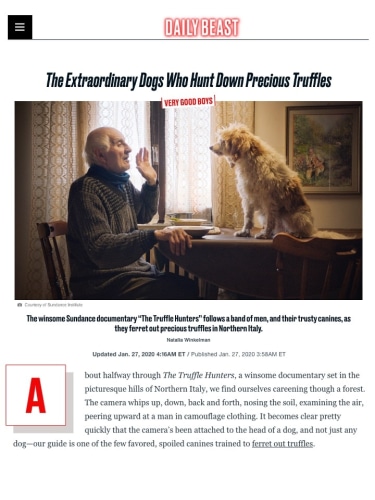The Extraordinary Dogs Who Hunt Down Precious Truffles
The Daily Beast
01/27/2020
Back
VERY GOOD BOYS
By Natalia Winkelman
The winsome Sundance documentary “The Truffle Hunters” follows a band of men, and their trusty canines, as they ferret out precious truffles in Northern Italy.
About halfway through The Truffle Hunters, a winsome documentary set in the picturesque hills of Northern Italy, we find ourselves careening though a forest. The camera whips up, down, back and forth, nosing the soil, examining the air, peering upward at a man in camouflage clothing. It becomes clear pretty quickly that the camera’s been attached to the head of a dog, and not just any dog—our guide is one of the few favored, spoiled canines trained to ferret out truffles.
I open with this scene because, despite what you might think from the title, this is not a film about truffles. This is a film about dogs, and how dogs can be both lovable and capable all at once. This might sound like a farce, but I’m serious: “If my dog dies, I would die too,” is truly a line in this film, and when it was uttered by the valiant truffle hunter, I believed him. In another moment, an aging, unmarried man coos to his pup, Birba, that he never had to find a wife because she was all that he needed in this world. It is moving.
The documentary centers on a band of men, and their trusty canines, as they carry on the difficult, rewarding task of searching for the precious white Alba truffle—which can run tens of thousands of dollars per pound—in the scenic woods of Northwest Italy. The dog theme is important because, if you’ve ever seen a raw truffle up close, you’ll know it’s not the most immediately attractive of foodstuffs. It’s brown and bumpy, maybe still smeared with soil or marred ever so slightly by a dog’s bite mark. It’s funny, when looking at one, to square up this dirty nugget with the exceptional status truffles have taken on for their enthusiasts. You could make a comparison to last year’s Uncut Gems, in which another lumpy-looking relic beguiles a cast of men, with increasingly menacing consequences.
Like that Safdies’ joint, The Truffle Hunters also deals with greed, though with a much more subtle hand. Other than the camera-on-dog sequence, directors Michael Dweck and Gregory Kershaw (The Last Race) prefer gorgeously composed static shots, some that last full minutes at a time. We meet our central characters without fanfare or introduction, gradually learning their stories and, most importantly, their dogs’ names, as we observe them in everyday life. There’s the unmarried gentleman who lets his sheeplike hound Birba eat pear slices out of his mouth; there’s the aging man who convinces his wife that he must keep truffle-hunting because Titina, his dog, would miss it too much if he stopped. The camera, in revealing these men’s portraits, is used strictly as an agent of observation, never once interjecting in the action. It’s a handsome way to share the quiet, rural lives of these men, and an honest one.
It’s also an apt choice for a film that, subtly, seeks to promote less interruption of these men’s way of life in general. Among the sequences depicting the men’s trade—their hiking, hunting, washing—are those that focus on the truffle industry, a luxurious and highly commercial world that arrives in sharp contrast to the hunters’ woodland idyll. In one repeated shot, a series of auctioneer workers fluff a plush red cushion, preparing it for the colossal truffle that will soon sit atop it and sell for thousands. In another scene, a posh truffle dealer takes a phone call to bargain out a truffle sale to a president. We learn that the greed in this sphere has become so pervasive as to turn off some of the hunters, causing them to renounce their trade for good.
But money-obsession isn’t the only problem they’re facing. We also learn that, year over year, conditions for truffles are worsening. The soil is getting drier and the weather less hospitable for growth. Climate change is never discussed outright, but as we watch the men compete with one another for finds and lament the rarity of discovery, it’s clear that the way of life they always enjoyed is at dire risk in more ways than one. The men themselves are also getting older, and we get the sense that, as they pass on, their craft may die off with them. When, at one point, a man tells his priest that his wife is forbidding him from hunting—she thinks it too dangerous for him in his old age—the priest assures him that he’ll be able to hunt in his afterlife.
Harping about these underlying tensions, though, risks distracting from the fact this is actually a very funny, very pleasant film about aging men and their very good boys and girls. In an early scene, we watch a hunter sitting beside his handsome black-and-white pup in a bathtub, belting out on off-tune song as he scrubs—and then blow-dries—the dog’s fur. Later, we see another enthusiastically serve his dog a birthday cake, with candles. These scenes are extremely pleasurable, carrying us through any moments that might otherwise have felt draggy or depressing. We know that these men, and their way of life, can’t last much longer. But at least Birba and Titina aren’t going anywhere.